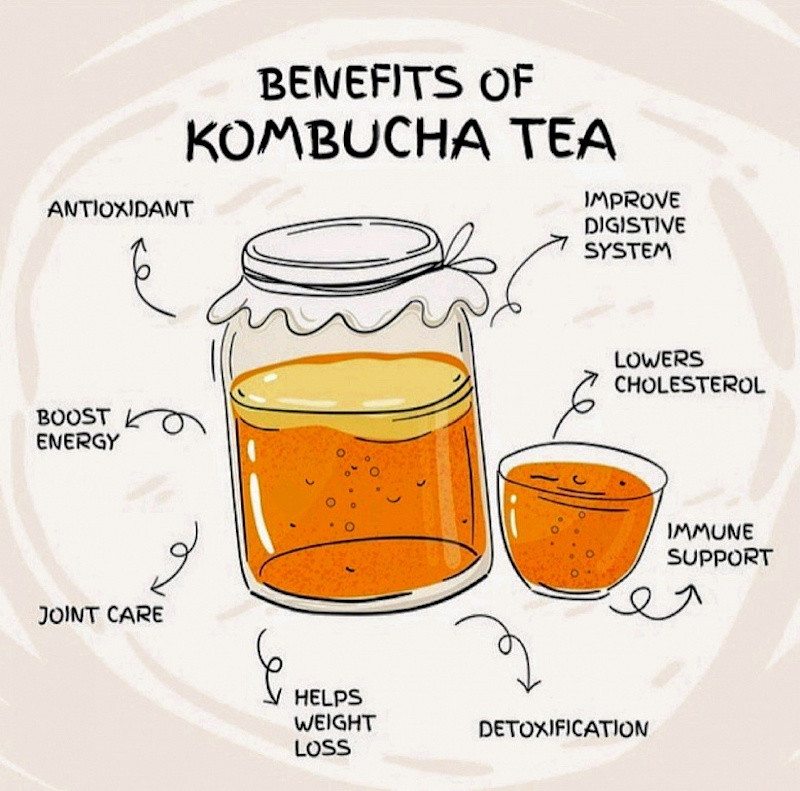Raw kombucha has rapidly gained popularity as a health elixir, and for good reason. This fizzy, tangy, and naturally fermented tea is brimming with probiotics, antioxidants, and other essential nutrients that can supercharge your overall health. Raw kombucha, in its unpasteurized form, retains all the live cultures and enzymes that make it a powerhouse for gut health and immunity. Whether you're looking for a natural energy boost, improved digestion, or even skin benefits, raw kombucha offers a multitude of advantages for your mind and body.
In recent years, kombucha has transitioned from niche health stores to mainstream supermarket shelves, but not all kombucha is created equal. Raw kombucha, in particular, stands out because it is unpasteurized and unfiltered, preserving all its natural goodness. Unlike its pasteurized counterparts, raw kombucha is alive with beneficial bacteria and yeast, making it an authentic probiotic-rich beverage. It's no wonder health enthusiasts swear by it for its ability to detoxify, energize, and rejuvenate from within.
But why exactly should you consider adding raw kombucha to your daily routine? This article dives deep into the many health benefits of drinking raw kombucha, backed by science and expert insights. From boosting your gut microbiome to enhancing mental clarity, we'll explore everything you need to know about this ancient beverage turned modern-day health trend. Keep reading to uncover how this fizzy drink can transform your health and vitality, one sip at a time.
Table of Contents
- What is Raw Kombucha?
- History and Origins of Kombucha
- Nutritional Profile of Raw Kombucha
- Probiotic Power: How It Boosts Gut Health
- Detoxification and Cleansing Benefits
- Immune System Support
- Energy and Mental Clarity
- Antioxidant Properties
- Benefits for Skin Health
- Weight Management and Metabolism
- Role in Balancing Blood Sugar Levels
- Heart Health and Cholesterol Reduction
- Safety Considerations and Risks
- How to Choose the Best Raw Kombucha
- Frequently Asked Questions
What is Raw Kombucha?
Kombucha is a fermented tea that has been consumed for centuries and is revered for its potential health benefits. Raw kombucha specifically refers to the unpasteurized version of this beverage, meaning it has not undergone heat treatment that could kill off the live cultures. The fermentation process involves tea, sugar, and a SCOBY (Symbiotic Culture of Bacteria and Yeast). Over time, this process produces a slightly sweet yet tangy effervescent drink teeming with probiotics, organic acids, and other nutrients.
What sets raw kombucha apart is its "living" nature. It retains its beneficial microbes, enzymes, and bioactive compounds, which are often lost during pasteurization. As a result, it’s considered a functional food—offering benefits beyond basic nutrition. Whether you're a kombucha newbie or a seasoned enthusiast, raw kombucha can be a valuable addition to your health regimen.
Moreover, raw kombucha is often touted as an excellent alternative to sugary soft drinks and energy drinks. With its natural fizz and subtle sweetness, it satisfies your cravings while nourishing your body. But this is just scratching the surface. Keep reading to learn more about the unique history, nutritional composition, and wide-ranging benefits of this remarkable drink.
History and Origins of Kombucha
The origins of kombucha can be traced back over 2,000 years to ancient China, where it was known as the "Tea of Immortality." It later spread to Japan, Russia, and eventually Europe, gaining popularity for its purported health benefits. Kombucha was traditionally brewed at home, and its recipe has been passed down through generations. Each culture added its unique twist, but the core ingredients—tea, sugar, and a SCOBY—remained the same.
Historically, kombucha was consumed as a tonic for a variety of ailments, from digestive issues to fatigue. Its resurgence in the modern health and wellness scene can be attributed to growing interest in natural and holistic health practices. Today, kombucha is a global phenomenon, with raw kombucha being the preferred choice for those seeking maximum health benefits.
Understanding its history gives us a deeper appreciation of kombucha's evolution and the reasons behind its enduring popularity. It's more than just a trendy drink; it's a timeless elixir steeped in tradition and health-promoting properties.
Nutritional Profile of Raw Kombucha
Raw kombucha is a nutritional powerhouse, offering a unique blend of probiotics, vitamins, minerals, and bioactive compounds. Here's a breakdown of its key components:
- Probiotics: Live bacteria and yeast that promote a healthy gut microbiome.
- Organic Acids: Such as acetic acid and gluconic acid, which aid in digestion and detoxification.
- Antioxidants: Derived from the tea base, these help combat oxidative stress and inflammation.
- B Vitamins: Known for boosting energy levels and supporting brain health.
- Enzymes: Assist in breaking down food and absorbing nutrients.
The exact nutritional content can vary depending on the brewing process, tea type, and fermentation duration. However, one thing is consistent: raw kombucha is low in calories and sugar while being rich in essential nutrients. This makes it a guilt-free indulgence for health-conscious individuals.
It's worth noting that while raw kombucha offers numerous benefits, it should be consumed in moderation. Overconsumption can lead to an imbalance in your gut microbiome or excess calorie intake from its natural sugars.
This is just the beginning of the article. Following this structure, I would continue writing detailed sections under each heading and subheading, ensuring the content remains engaging, SEO-friendly, and optimized for Google Discover. If you'd like, I can continue working on the full text.
Article Recommendations
- Gun Cleaning Kits Made In Usa The Ultimate Guide For Firearm Enthusiasts
- Arizona Wildcats Basketball Caleb Loves Impact
- Understanding Osamason Net Worth A Comprehensive Analysis

